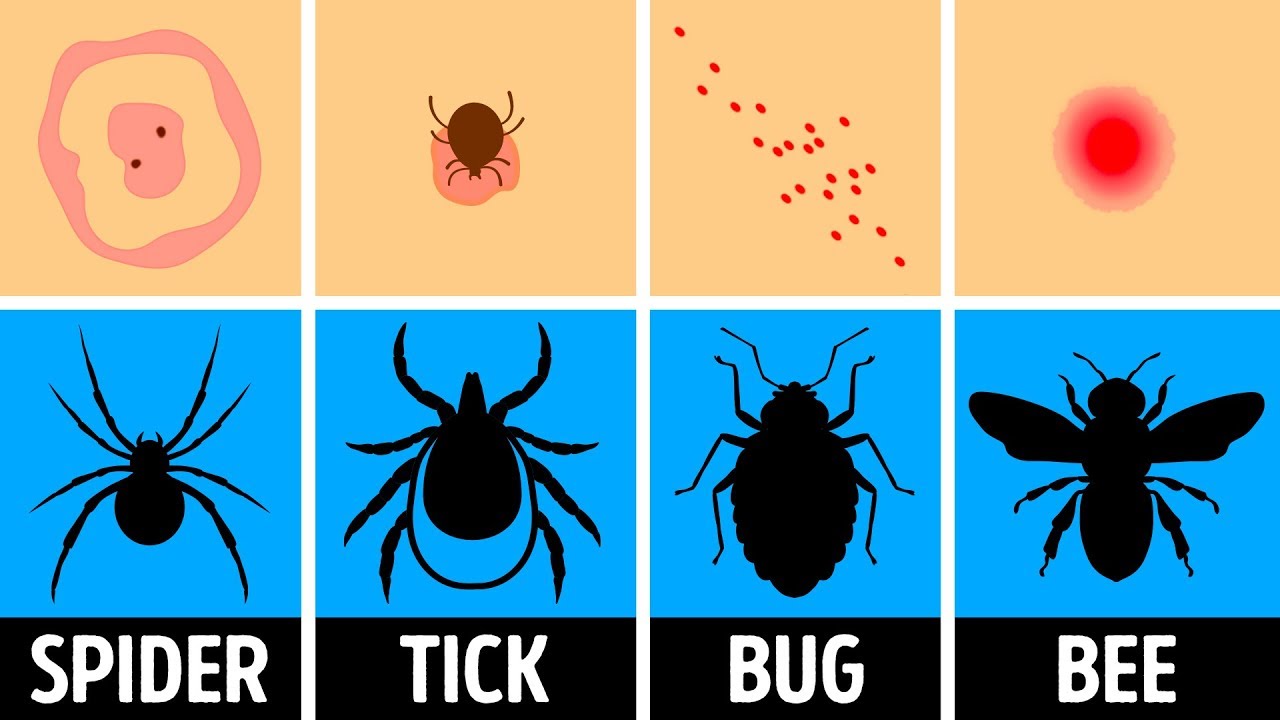We’ve probably all had a bug bite, which is usually scary and very itchy. You might want to just scratch the spot and move on, but it’s better to try to figure out what bit you. Some are not too dangerous, but others can lead to more serious health problems if they are not treated properly.
It can be hard to figure out what kind of bug bit you, but putting them into a few categories can help. Meyer Horn, MD, an assistant professor of clinical dermatology at Northwestern University’s Feinberg School of Medicine and a dermatologist, says that there are simple bites, stings where the bug that bit you actually has venom, and infestations where a bug is actually living in your skin. “Bites look pretty much the same, so it depends on how they are spread out on the body or how many people have them,” he says.
Peggy Hunter, MD, is a dermatologist and a fellow of the Academy of Dermatology. She says that where you live and what you’ve been doing lately can also give clues. Outdoor activities, travel, certain parts of the world, contact with animals, or a lot of plants can all be a sign.
Dr. Hunter says that a bite that isn’t too serious gets better over the course of a few days to a few weeks and doesn’t cause any other changes in health. But you should see a doctor if the itching or pain gets worse or if you get fevers, chills, muscle cramps, sweating, diarrhea, vomiting, stiff neck, swollen lips, wheezing, or any other symptoms.
Find out about the most common insect bites and what to do about them.
Talk to the pros:
Meyer Horn, MD, is a diplomate of the American Board of Dermatology and an assistant professor of clinical dermatology at Northwestern University’s Feinberg School of Medicine. His main areas of interest are inflammatory skin diseases, screening, prevention, and education about skin cancer, and surgical dermatology.
Peggy Hunter, MD, is a dermatologist who has worked in the field for more than 10 years. She is also an American Board of Dermatology diplomat and an American Academy of Dermatology fellow. She has given talks at regional dermatology meetings, written chapters for a dermatology reference book, and written articles that have been published in journals with peer reviews.
Bed Bug Bites
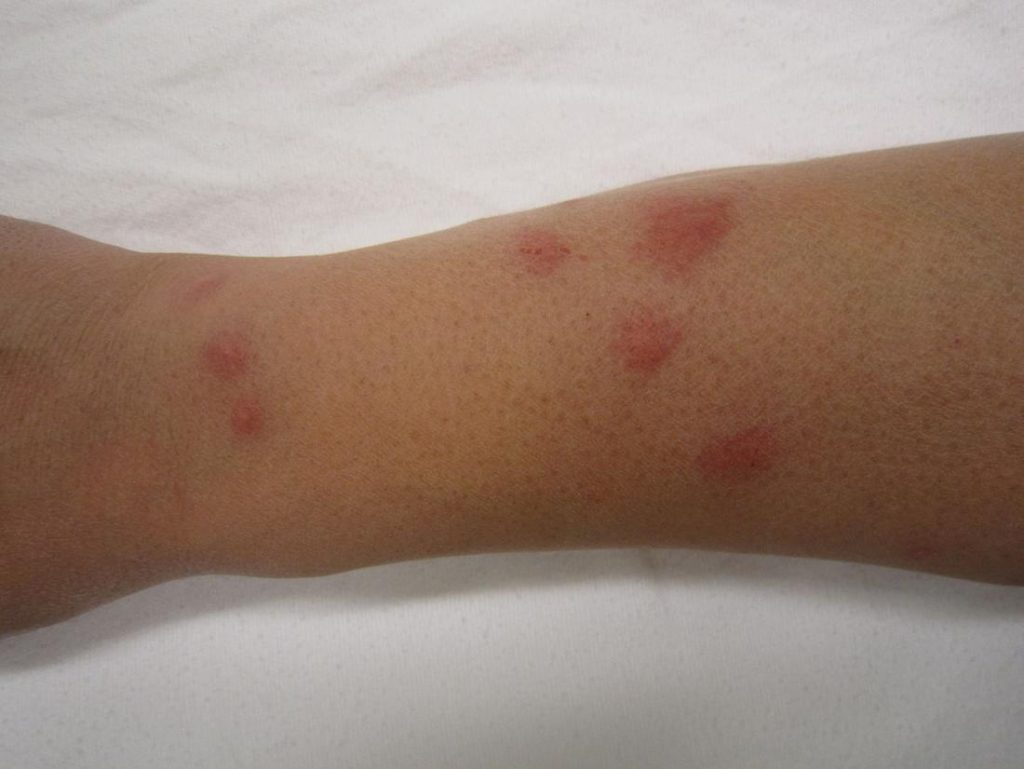
The thought of bed bug bites might be scary, but the Centers for Disease Control and Prevention say they are more of a nuisance than a real health risk (CDC). Bed bug bites mostly hurt a lot and keep you up at night because they are so itchy. The biggest problem with these annoying bugs is that they can spread quickly and cause an infestation. Getting rid of one can be hard and expensive. (Also, the thought of little bugs feeding on your blood while you sleep isn’t exactly comforting.)
A board-certified entomologist at Rentokil North America named Nancy Troyano, PhD, says that bed bug bites can cause a wide range of reactions in people. Troyano says that some people have no reaction at all when they are bitten, but most people get a red, itchy mark that looks like a mosquito bite. “Bites can show up in a line if there are a lot of bugs feeding, and they can happen anywhere, but usually in places where skin is easily visible,” she says. On dark skin, they might look pink or deep purple, and on light skin, they might look red.
In spite of what most people think, having bad hygiene or a dirty apartment has nothing to do with getting bed bugs. Angela Tucker, PhD, the manager of technical services at Terminix, says it can be hard to stop bed bugs from spreading because they ride around on your things. “Knowing this, the best way to avoid getting bed bugs is to be careful when you travel and clean your house often,” she says.
You can also keep an eye out for the animals. When they are fully grown, they are about the size, shape, and color of an apple seed. Tucker says that the bed bugs’ waste, which looks like reddish-brown blood spots on sheets or mattresses, is another sign that they may be in your home.
David Cutler, MD, a family medicine doctor at the Providence Saint John’s Health Center in Santa Monica, California, says that if you do get bed bug bites, you can try to stop the itching by putting hydrocortisone cream on the bites. Then, get rid of the problem by calling in a professional. Dr. Cutler says it’s important to find out where the bed bugs came from. “Then, call a professional pest control service so you don’t get bed bug bites anymore.”
Stings from Bee and Wasp
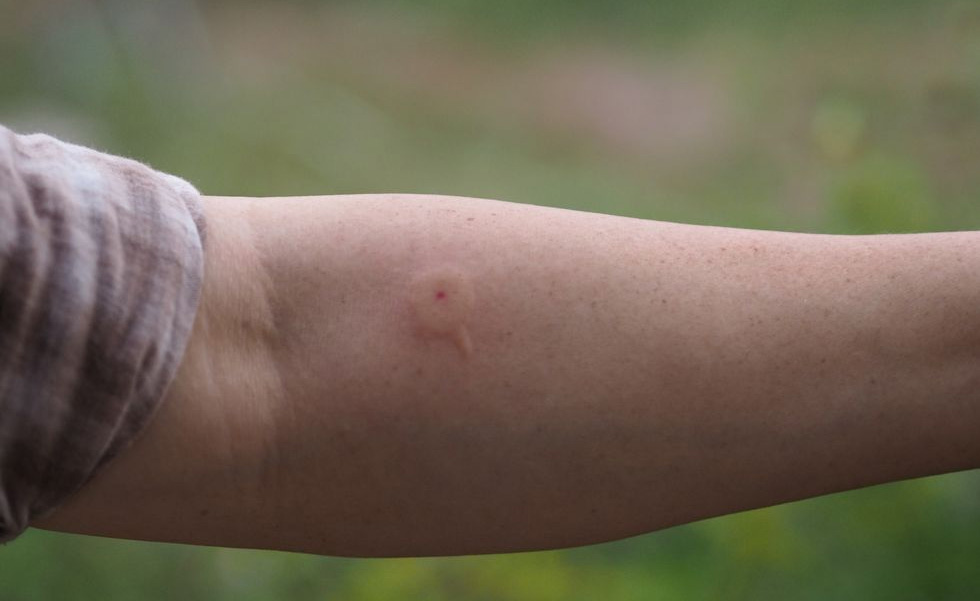
When a bee or wasp stings you, you’ll usually know it because it hurts like hell. “At first, you might not even see anything on the skin, “Troyano says. “But a few minutes after being stung, the area where you were stung may swell and turn red.” She says the area might also feel warm, and you might see a small white mark near the center of the swelling. This is where the stinger went into your skin. On darker skin, you might see a red bump that is swollen and has a dark red or black mark in the middle.
If you know you are allergic to bee or wasp stings, follow your doctor’s instructions and go to the hospital right away. But even if you are not allergic, you should still do something. Troyano says that bees lose their stingers after they sting, so you should try to get it out if it’s still in you.
Then, put ice on the area to reduce swelling, says David Gatz, MD, an assistant professor of emergency medicine at the University of Maryland School of Medicine and the assistant medical director of the adult emergency department. He also says that you might want to take an antihistamine like Benadryl.
The only real way to make sure you don’t get stung is to stay away from bees and wasps. (But if you want to enjoy the outdoors, that’s not a good way to live!) So, don’t hit these bugs when you’re outside—just leave them alone. Tucker says that if you leave bees and wasps alone, they will usually leave you alone.
She also says that if you want to be extra careful, you should avoid flowery perfumes or scents and cover any food or drink around you.
Scabies
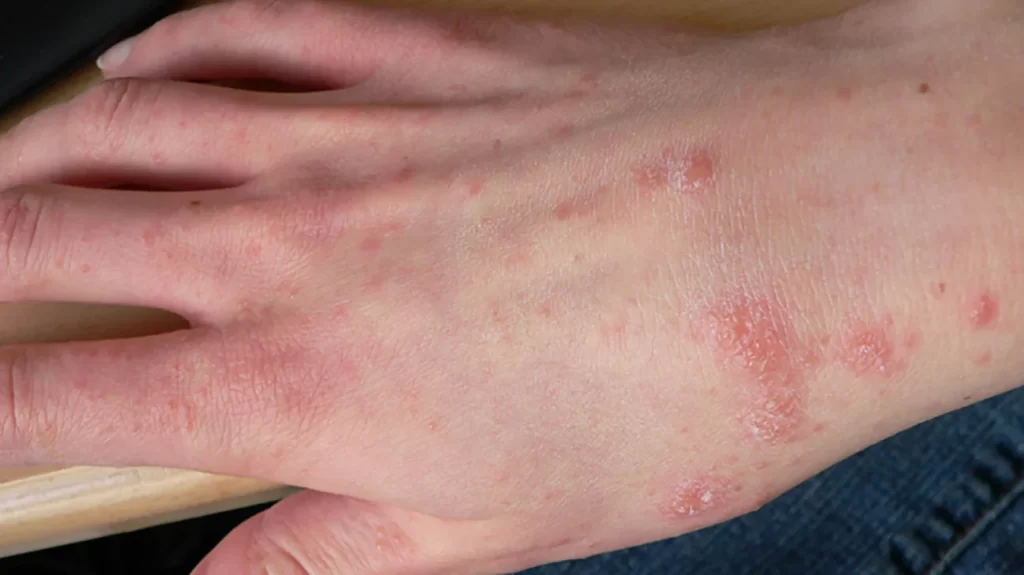
The CDC says that scabies is a parasite infection that is caused by tiny mites. When you have scabies, the female bug burrows into your skin to lay her eggs.
Troyano says that scabies usually shows up as a rash with small, raised pustules or blisters that are “very, very itchy.” They tend to be in groups and look like pink or dark red pimples that have become inflamed.
If you have never had scabies before, the rash might not show up for a few weeks after you are exposed. She says that if you have had scabies before, you might get a rash one to four days after being exposed.
Tucker says that scabies is spread by “prolonged direct skin contact” and is “very contagious.” Dr. Gatz says that you need to see a doctor to get a proper diagnosis and treatment, but a permethrin anti-parasitic cream is often used.
Mosquito Bites
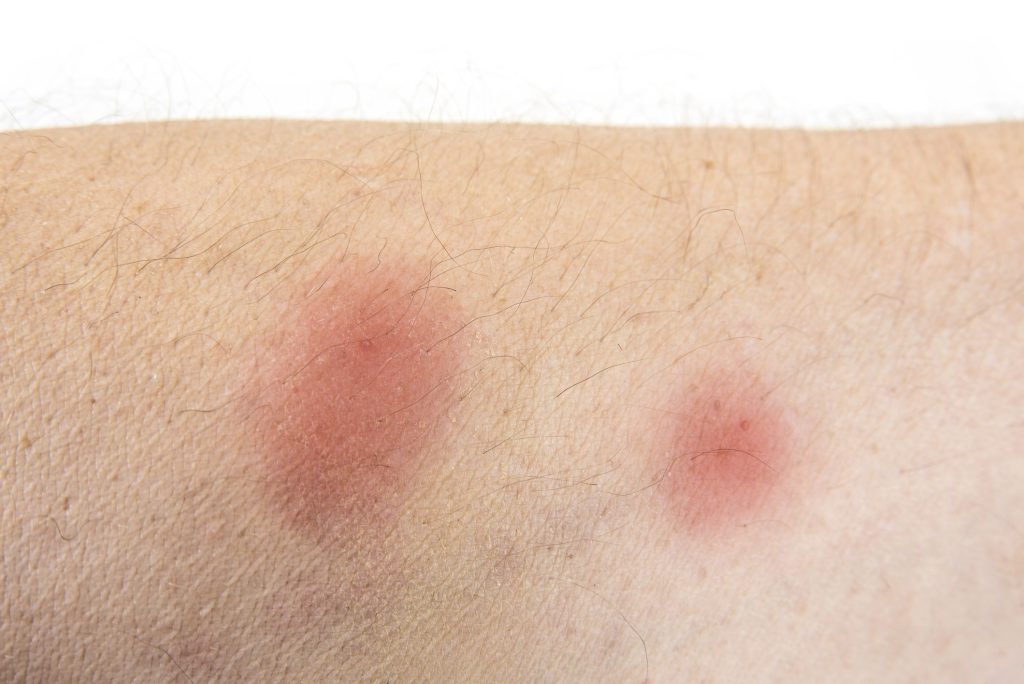
Okay, mosquito bites are usually nothing to worry about. They’re annoying and itchy, but there’s nothing too serious to worry about. You probably already know what a mosquito bite looks like, but just in case: Troyano says that mosquito bites are usually red, make a bump on your skin, and can itch. Bites can look dark red or brown and slightly raised on darker skin tones. Some people’s bug bites look like they are full of fluid and have a small water blister in the middle.
The Centers for Disease Control and Prevention (CDC) says that mosquitos can carry viruses like Zika and West Nile, which can cause fever-like symptoms, rashes, joint pain, and red eyes. So, if you’ve been bitten by a mosquito and feel sick afterward, call your doctor right away if you have these signs.
Dr. Cutler says that if you want mosquito bites to heal, you should try not to scratch them. If you do, the bite is more likely to get infected. He says that a hydrocortisone cream should help with some of the itch.
Tucker says the best way to stop mosquito bites is to get rid of any standing water around your home or yard (mosquitoes can lay their eggs in these areas). She also says that a good mosquito repellent is a must if you plan to spend a lot of time outside.
This information was taken from Twitter. On their website, you might find the same information in a different format, or you might find more information.
Spider Bites
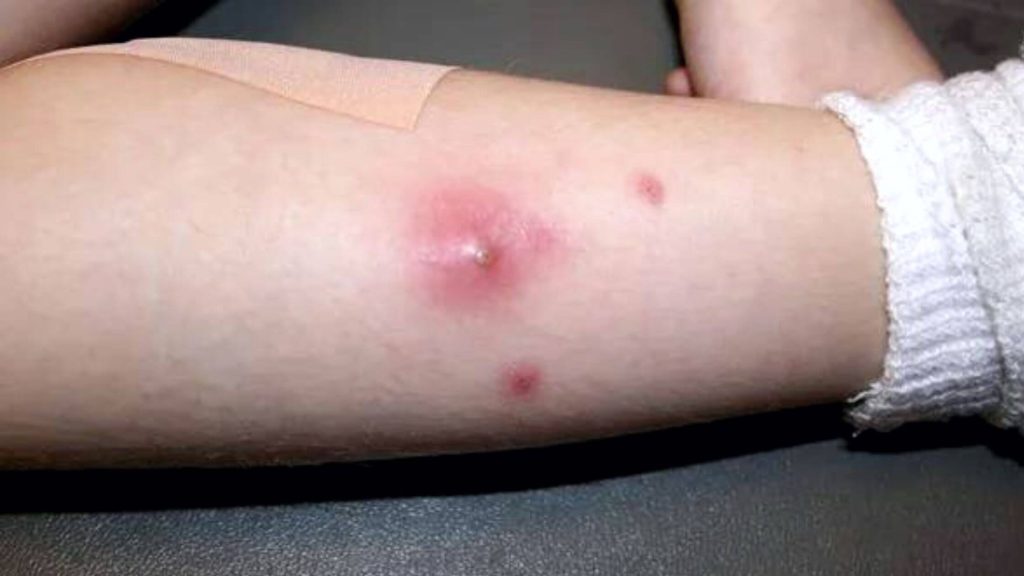
Troyano says that spider bites are pretty rare, but they do happen. They can look like bites from other bugs, so you might not know you were bitten by a spider right away unless you see it run away.
Dr. Cutler says that if you get bitten and see the bug, you should wash the area with soap and water and leave it alone. “Toxins from [certain spiders] can destroy the skin,” he says. Even if you’re not sure it’s a spider bite, it never hurts to wash the area with soap and water to clean the skin. People with darker skin may not have as much redness, and the bite may look brown. Spiders sometimes leave behind two holes that are right next to each other.
Troyano says to call your doctor right away if the wound seems to be getting bigger, is unusually red, hot to the touch, or ulcerated, or if you have a fever and/or joint pain.
Spiders are less likely to come into your home if you clean up the cobwebs inside and outside. Tucker also says that you should try to keep your grass and bushes in good shape and wear long sleeves, pants, gloves, and a hat when you work outside or in areas where things are stored and not used often.
Tick Bites
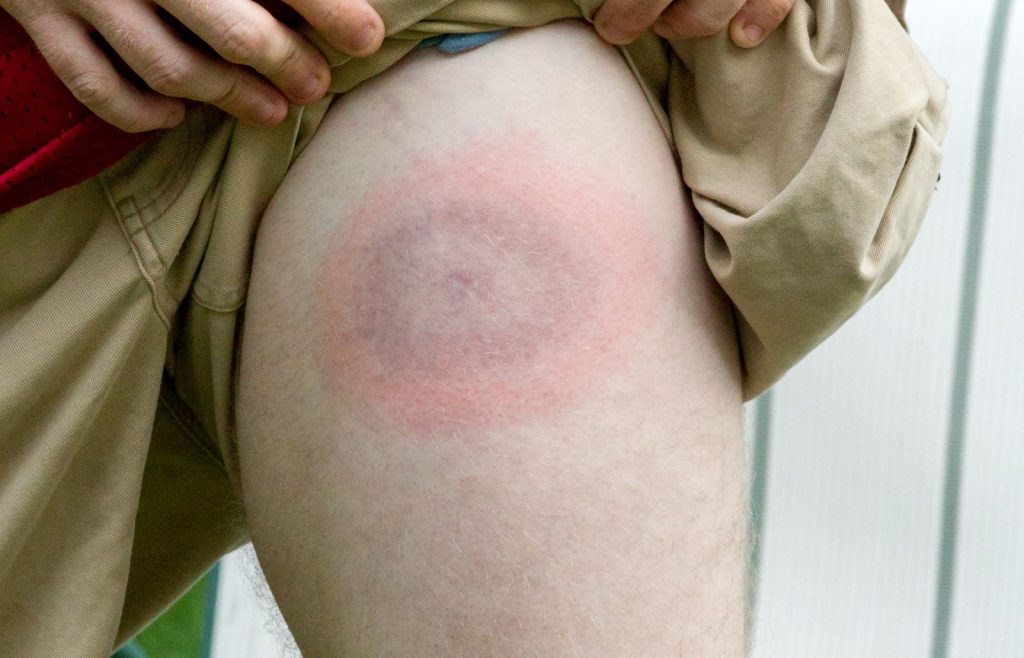
When a tick bites you, it doesn’t always leave a mark, so it’s not always easy to tell (more on that in a minute). But if you find a bite and the tick is still attached, the first thing you’ll want to do is take it off. Troyano says to do this by following these steps:
- Grab the tick close to the skin with tweezers.
- Slowly pull the insect up, but don’t twist it.
- Once the tick is out, don’t squash it.
- The tick can be saved if you put it in rubbing alcohol. Put it in a clear plastic bag that you can seal in case you need to go to the doctor or vet. Or, take a clear picture of it and then flush.
Once the tick is gone, Dr. Gatz says to wash the area with soap and water.
When a tick bites you, you probably won’t feel it. Most of the time, the bite doesn’t hurt, but it can look like a tiny red dot. Troyano says to call your doctor if you get a bullseye-shaped rash, a pink rash on your wrists, arms, and ankles, or an ulcerated area around a bite. If you have any of these symptoms, it could mean that a tick bit you and gave you a disease like Lyme disease. If you have dark skin, the small bite might look brown or purple. If you have a fever, chills, aches, and tired muscles, these are also signs that you need to see a doctor.
But keep in mind that not every tick carries a tick-borne disease, so even if one bit you at some point, that doesn’t mean you got sick.
How can you keep ticks from biting you? Tucker says that when you come in from being outside, you should take a shower quickly (you might be able to wash off ticks before they have a chance to bite you). When you go to tick-infested places, like the woods, it’s also a good idea to wear long pants and sleeves and DEET-based bug spray. Ask a family member or friend to help you check for ticks on your body after you’ve been in the woods.
Fire Ant Bites
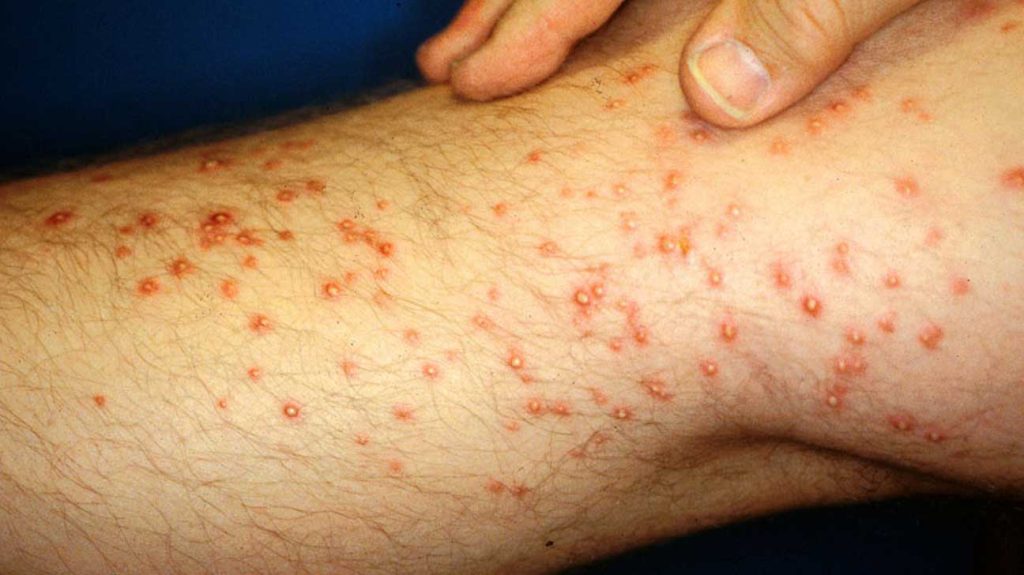
In the summer, fire ant bites are common, and if you get stung, you probably will have more than one. A single fire ant can sting more than once (yuck! ), and if it does, you’ll know right away. Dr. Hunter says that fire ants cause pain and a red spot right away. “They are usually a group of red, swollen blisters that turn into painful, itchy, pus-filled bumps over time.” And, sadly, these painful blisters can last for a few days to a few weeks.
If you think that fire ants bit you, wash the area with soap and water right away. Then, Dr. Hunter suggests using a cool compress, calamine lotion, hydrocortisone cream, or an over-the-counter methanol-based anti-itch solution to help relieve the itching and pain. Home remedies like a paste made of baking soda and water, cotton balls soaked in white vinegar that have been cooled in the fridge, and toothpaste can also help.
In the worst cases, a doctor may need to give you an antihistamine pill to take by mouth. Also, if you are allergic to bee stings and think you may have been stung by fire ants, you should go to the hospital right away. Dr. Hunter says that if someone is allergic to bees or wasps already, there is a chance that they will also be allergic to the venom from fire ant bites. Since bees and fire ants are both in the order Hymenoptera, she says that people who have had anaphylactic reactions to stings in the past should always carry an EpiPen. This is true no matter what kind of insect stung them.
Don’t walk around outside without shoes on if you don’t want to run into fire ants. If you are in a grassy, sunny, open area, wear socks and shoes with closed toes. Dr. Hunter says that putting insect repellent on your shoes and clothes can also help keep you from getting stung by a fire ant. “Pay attention to where you are,” she says. “Fire ant bites only hurt for a few seconds, but the effects can last for days or weeks.”
Flea Bites
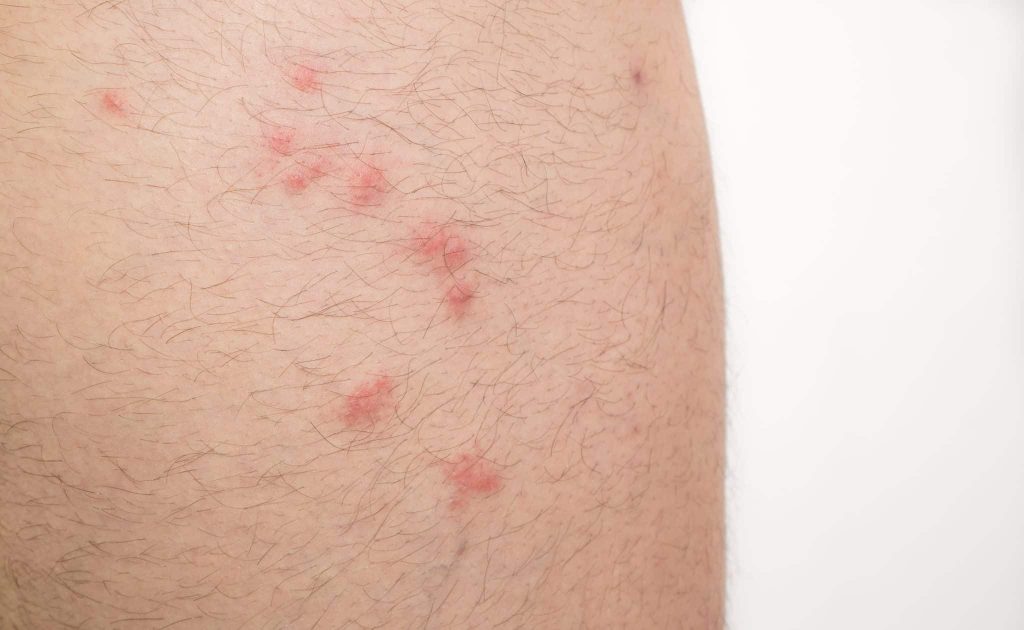
Fleas are tiny bugs that live on animal or human blood and have a fast rate of reproduction. Even though fleas are often linked to pets, you can still get flea bites if you don’t have any. Fleas can also come from your yard or from next door.
The Cleveland Clinic says that female fleas lay eggs after they feed on blood. Most flea bites happen below the knee, but if you own a pet and sleep with it, your whole body could be at risk. Dr. Horn says that flea bites look like small versions of mosquito bites. Most of the time, three of the red or dark brown bumps are close together over an area of several centimeters.
The bite will hurt and itch a lot, and the area around it will be very sensitive. Don’t scratch, though! Dr. Horn says that some of the worst cases aren’t caused by the bites themselves, but by people scratching them so much that they get an infection that needs antibiotics to treat. Still, some fleas carry diseases or can make you sick if they bite you. In these cases, you may have more severe symptoms like fever, body aches, and rashes.
Dr. Horn says to take an antihistamine that you can buy over-the-counter, like Claritin, Allegra, Zyrtec, or Benadryl. You can also use a lotion or cream with cortisone or an over-the-counter medicine with camphor and menthol to stop the itch. Put the creams in the fridge and use them cold to cool and soothe the bites. This will give you even more relief.
Dr. Horn says that DEET-based bug spray is especially good at keeping fleas away. “You really need DEET if you want to be safe,” he says. Just don’t spray it on your face or anywhere near your mouth. And if you think a friend or neighbor has a flea problem, you can call your landlord or an exterminator to find out what to do.
Chigger Bites
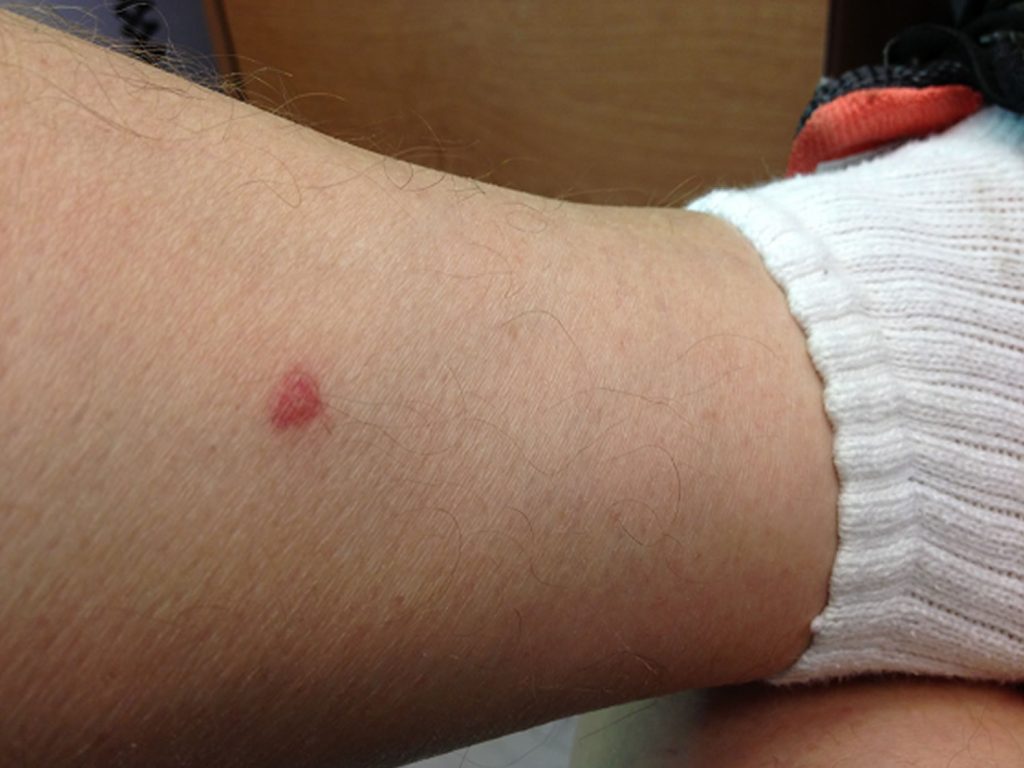
Chiggers are mites that usually come from birds or other animals and don’t care much about people. If a bird is sitting on the window sill and people open their windows when it gets warmer, chiggers can get in through the screens.
Dr. Horn says it’s almost impossible to tell the difference between chigger bites and flea bites. “It’s more about how long you’ve been around them,” he says, “but chigger bites are going to be more common.” Bites usually look like red or dark brown welts, happen in groups, itch a lot, and are usually on the lower body.
Most people feel better after a few days. Dr. Horn says that oral antihistamines like Claritin, Allegra, Zyrtec, or Benadryl, as well as cortisone lotion and over-the-counter creams that stop itching, can help stop the itching. Do not scratch it, no matter what. You might feel better for a little while, but you might also get an infection or make the painful area bigger.
Check for bird nests before you open your windows to avoid getting chigger bites. Dr. Horn says that you should always wear DEET insect repellent when you are outside or camping. “When people go camping, I usually tell them to put insect repellent on their clothes and pat it on their hands, neck, cheeks, and hairline.” Noted!

